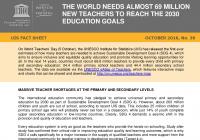According to UIS projections, about 69 million teachers must be recruited to achieve universal primary and secondary education by 2030.
The quality of education ultimately depends on teachers. This is why Sustainable Development Goal 4 (SDG 4) specifically calls on countries and donors to significantly increase their recruitment and training. To monitor progress and better target policies, the UIS produces a range of indicators about teachers given their essential role in providing quality education to all.
Based on its annual data collection, the UIS provides a core set of indicators to track trends in teacher numbers, pupil-teacher ratios and teacher qualifications. The UIS also produces projections on teacher shortages globally and by region, while providing more detailed information on the characteristics, working conditions, salaries and training of teachers.
For example, the UIS is conducting a special survey involving 21 countries in East, South and West Asia to produce sub-national data on the qualifications, recruitment and deployment of teachers. With these new indicators, countries can see the extent to which trained teachers are distributed in rural versus urban areas, for example, while identifying the areas facing an aging workforce of teachers.
In higher education, the region facing the greatest shortage of teachers, UIS data show the extent to which teachers are faced with overcrowded, multi-grade classrooms or access to textbooks and basic services, such as electricity in schools.
Overall, UIS data on teachers enable policymakers at the global, regional and national levels to better direct resources and policies towards improving the quality and equity of education.
